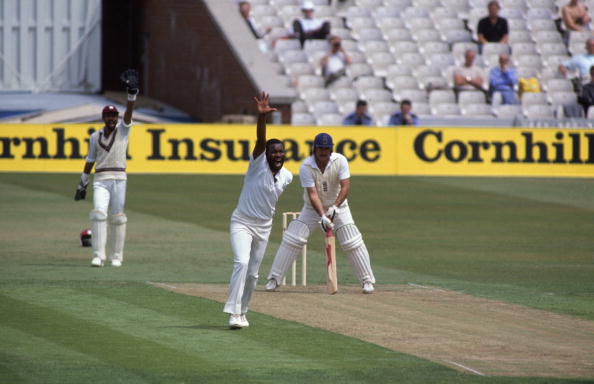Richard Edwards looks back at a humiliating summer when England were hit by controversy and the mighty tourists
As England arrived at Nottingham in the first week of June 1988, Mike Gatting was a man under pressure. From a cricket perspective, England hadn’t won a match since the Boxing Day Test of 1986, a run of 14 matches that included home and away series losses to Pakistan.
The latter, infamously, involved the England captain becoming embroiled in an unsavoury altercation with local umpire, Shakoor Rana, in Faisalabad – an incident which rapidly escalated into an international incident. The third day of the Test was called off and the tour came close to being cancelled.
Gatting was effectively muzzled by the then Test and County Cricket Board (TCCB) and prevented from talking about the incident for two years. Or so the TCCB thought. As England began their preparations for the toughest test in cricket – the visit of the West Indies – Gatting was fighting fires from every conceivable angle.
The publication of his book Leading From The Front was due to contain Gatting’s versions of events – a revelation that sent the powers-that-be into a state of panic and led to frantic negotiations between respective legal teams to remove the offending pages.
It was hardly the backdrop that Gatting wanted as he attempted to end England’s miserable 10-match losing streak against the Kings of the Caribbean. Worse, though, was to follow.
Just hours after drawing the Trent Bridge Test, courtesy of the batting heroics of Graham Gooch and David Gower in a last-day rearguard action, lurid headlines appeared in The Sun involving a number of, as then un-named, England cricketers during the team’s stay at Rothley Court in Leicestershire.
“I want to find out if this is true,” said Mickey Stewart, the England manager who had been brought in ostensibly to improve discipline within the squad. “If it is, disciplinary action will be taken.”
With Gatting identified as one of the main protagonists, it was the stuff of nightmares for both the captain and a board who had been looking desperately for an excuse to remove him since the events in Faisalabad the previous winter.
No-one could accuse the TCCB of sitting on their hands. Despite Gatting denying anything untoward had happened – and despite the other players implicated being exonerated – the TCCB dismissed the captain three days later. The explanation of the decision from chairman of selectors, Peter May, did little to quell the suspicion that Gatting had been royally stitched up.
“Gatting, caught rumour, bowled hypocrisy, 0” bellowed the headline in the Melbourne Age.
Worse was to follow for the Middlesex man, with the TCCB dishing out a £5,000 fine – double the previous record – for breaching his tour contract in his book.
The touring West Indians could only watch on, smiling broadly at England’s self-inflicted implosion.
Having ditched Gatting with indecent haste, the selectors now had some pressing decisions to make, most notably who should replace a man who had led England to an Ashes triumph Down Under just 18 months previously.
Step forward, John Emburey, whose 16 overs had disappeared for 96 in the West Indies’ only innings in Nottingham. It was hardly a long-term solution, with Gatting’s county colleague laughably appointed on a one-match trial basis. It was, though, soon to look a masterstroke.
“When you take over as England cricket captain at a time of rumour, recrimination and failure, you do not reduce West Indies to 54-5 on your first morning in charge. It happens only in dreams and dog-eared comics,” wrote Alan Lee in The Times.
Some classic swing bowling by Graham Dilley had reduced the West Indies top order to rubble in front of a disbelieving second Test crowd. Emburey’s side eventually dismissed the West Indies for 209. Talk was rife of a first England win over the tourists at headquarters since 1957. Lee opined that the “grim pall” had been lifted from English cricket.
It was a brief moment of release. Within a day normal service had been resumed – England subsiding from 112-2 to 165 all out – and the West Indies would win the Test by 134 runs. The vultures were already circling over the new captain, who was granted a second bite of the cherry at Old Trafford.
In Manchester it was violins, rather than knives, out for the captain. Humiliatingly dismissed for 135, in their first innings, Emburey was asked at the end of day two what could possibly save England.
He looked forlornly out of the window in the vain hope of seeing gathering cloud. It was hardly a plan to fill English cricket lovers with hope.
A returning Gatting scored four runs in his two innings and England’s second innings was worse than their first. A paltry 93 was all they could manage against the majesty of Malcolm Marshall, who took 7-22 in 15 beguiling overs.
With the series already gone, the writing was on the wall for Emburey – few, though, saw what was coming next.
“After 10 days of debate and indecision, England’s selectors stepped boldly into the unknown yesterday when they named Christopher Cowdrey as captain for the two remaining Tests of a so far dispiriting series against the West Indies,” wrote Lee in The Times.
Cowdrey’s enterprising leadership had already taken Kent to the top of the County Championship and now his godfather, May, clearly hoped that the Midas touch he had shown at Canterbury could rub off on an England side stumbling inelegantly through a painful summer.
It was the first time in a series since 1966 that England had used three captains – the second skipper to be sacked before the final Test of that summer? Chris’s father, Colin.
Cowdrey was afforded a guard of honour by Surrey at Guildford after being appointed, and the selectors followed up one shock decision with a characteristically brutal cull of those players who had underwhelmed in Manchester.
In came new caps Tim Curtis and Robin Smith while six of the final 11 at Old Trafford were left out. If this was a brave new era, however, it didn’t take long for a familiar storyline to play out.
Bowled out for 201, England gave themselves the faint whiff of a chance by reducing the visitors to 156-5 on day two. An eventual score of 275, however, was always likely to prove too much for Cowdrey’s side and despite his brave talk of declaring and setting the West Indies a second innings target, Richards’ side ultimately strolled to victory.
“The major disappointment is that we lost by 10 wickets,” he said. A nation nodded.
The final insult in one of the most remarkable chapters in English cricket came when Cowdrey suffered a bruised foot that rendered him unavailable for the final Test. In what looked like the ultimate hospital pass, Graham Gooch was picked to do a job that he should perhaps have been handed after Gatting’s dismissal.
There was more woe to come in an inevitable defeat at the Oval – albeit one that demonstrated that England weren’t quite as far behind the West Indies as some would have believed – when Gooch was injured and was replaced by Derek Pringle for the final day of the series.
The summer of four captains was over.
“If you watch history videos of the Somme and then put them in a modern context you just think how naïve it all was,” says Bill Athey who played his last Test at Headingley that summer.
“It was the same with the England cricket team back then. If it wasn’t working you changed everything. The fact was that the West Indies were just better than us. It didn’t matter who was captain.”
Gatting, Emburey, Cowdrey and then Gooch proved that beyond all doubt.
This piece originally featured in The Cricket Paper, April 14 2017
Subscribe to the digital edition of The Cricket Paper here















